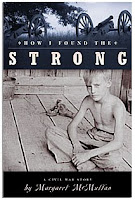
Title: How I Found the Strong
Author: Margaret McMullan
Publisher: Houghton Mifflin
Year: 2004
# Pages: 136
Category: History choice, Historical Fiction Presentation
Genre: Historical Fiction
My Summary & Critique:
How I Found the Strong is a novel about the effects of the Civil War on a young boy and his family in rural Mississippi. It is told from the perspective of ten-year-old Frank Russell, who wishes he could have gone off to war with his father and brother, Henry, who is fourteen and “old enough to be a soldier.” Frank is the baby of the family, nicknamed “Shanks” because of his skinny legs, and rarely given any serious attention or respect. As the war takes its toll on the South, his family suffers extreme poverty, death, abandonment, and near-starvation. All that’s left at home are Shanks, his mother, the new baby, and their slave, Buck, who is not much older than Shanks. With each passing season, Shanks witnesses more of the hardships and atrocities of war and comes to his own conclusions about slavery, cowardice, and ultimately, his own strength.
Margaret McMullan’s novel about the Civil War is unlike any other novel I have read regarding this period in history. Learning about the war through the eyes of a ten year old boy has been particularly interesting, but also seeing the war from the viewpoint of someone slightly outside of it, in the suburbs of the war, so to speak, has been an intriguing and enlightening experience. McMullan touches on all the expected issues related to the war like Southern attitudes toward the North, toward slavery, their confidence that the war wouldn’t last, and of course the vivid atrocities of war as Shanks sees these with his own eyes in a makeshift hospital for wounded soldiers. The author also handles other issues such as desertion, lynching, the relationship between a slave and his master’s family, the humility of poverty, the nature of freedom, and the cruelty that walks hand-in-hand with racism. McMullan achieves a wonderful coming-of-age story amidst the depressing climate of war and poverty that would be excellent for young adults to read and discuss in classes as a supplement to the historical facts they learn about the Civil War period.
what is the climax of the story
ReplyDelete